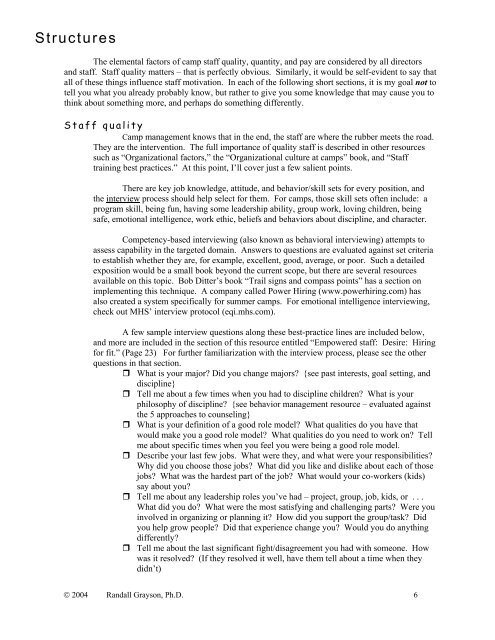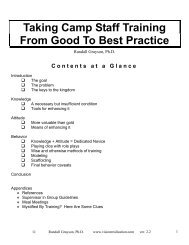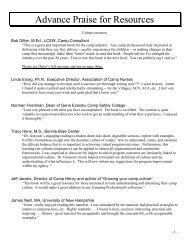Staff motivation - Vision Realization
Staff motivation - Vision Realization
Staff motivation - Vision Realization
You also want an ePaper? Increase the reach of your titles
YUMPU automatically turns print PDFs into web optimized ePapers that Google loves.
Structures<br />
The elemental factors of camp staff quality, quantity, and pay are considered by all directors<br />
and staff. <strong>Staff</strong> quality matters – that is perfectly obvious. Similarly, it would be self-evident to say that<br />
all of these things influence staff <strong>motivation</strong>. In each of the following short sections, it is my goal not to<br />
tell you what you already probably know, but rather to give you some knowledge that may cause you to<br />
think about something more, and perhaps do something differently.<br />
<strong>Staff</strong> quality<br />
Camp management knows that in the end, the staff are where the rubber meets the road.<br />
They are the intervention. The full importance of quality staff is described in other resources<br />
such as “Organizational factors,” the “Organizational culture at camps” book, and “<strong>Staff</strong><br />
training best practices.” At this point, I’ll cover just a few salient points.<br />
There are key job knowledge, attitude, and behavior/skill sets for every position, and<br />
the interview process should help select for them. For camps, those skill sets often include: a<br />
program skill, being fun, having some leadership ability, group work, loving children, being<br />
safe, emotional intelligence, work ethic, beliefs and behaviors about discipline, and character.<br />
Competency-based interviewing (also known as behavioral interviewing) attempts to<br />
assess capability in the targeted domain. Answers to questions are evaluated against set criteria<br />
to establish whether they are, for example, excellent, good, average, or poor. Such a detailed<br />
exposition would be a small book beyond the current scope, but there are several resources<br />
available on this topic. Bob Ditter’s book “Trail signs and compass points” has a section on<br />
implementing this technique. A company called Power Hiring (www.powerhiring.com) has<br />
also created a system specifically for summer camps. For emotional intelligence interviewing,<br />
check out MHS’ interview protocol (eqi.mhs.com).<br />
A few sample interview questions along these best-practice lines are included below,<br />
and more are included in the section of this resource entitled “Empowered staff: Desire: Hiring<br />
for fit.” (Page 23) For further familiarization with the interview process, please see the other<br />
questions in that section.<br />
What is your major? Did you change majors? {see past interests, goal setting, and<br />
discipline}<br />
Tell me about a few times when you had to discipline children? What is your<br />
philosophy of discipline? {see behavior management resource – evaluated against<br />
the 5 approaches to counseling}<br />
What is your definition of a good role model? What qualities do you have that<br />
would make you a good role model? What qualities do you need to work on? Tell<br />
me about specific times when you feel you were being a good role model.<br />
Describe your last few jobs. What were they, and what were your responsibilities?<br />
Why did you choose those jobs? What did you like and dislike about each of those<br />
jobs? What was the hardest part of the job? What would your co-workers (kids)<br />
say about you?<br />
Tell me about any leadership roles you’ve had – project, group, job, kids, or . . .<br />
What did you do? What were the most satisfying and challenging parts? Were you<br />
involved in organizing or planning it? How did you support the group/task? Did<br />
you help grow people? Did that experience change you? Would you do anything<br />
differently?<br />
Tell me about the last significant fight/disagreement you had with someone. How<br />
was it resolved? (If they resolved it well, have them tell about a time when they<br />
didn’t)<br />
© 2004 Randall Grayson, Ph.D. 6





